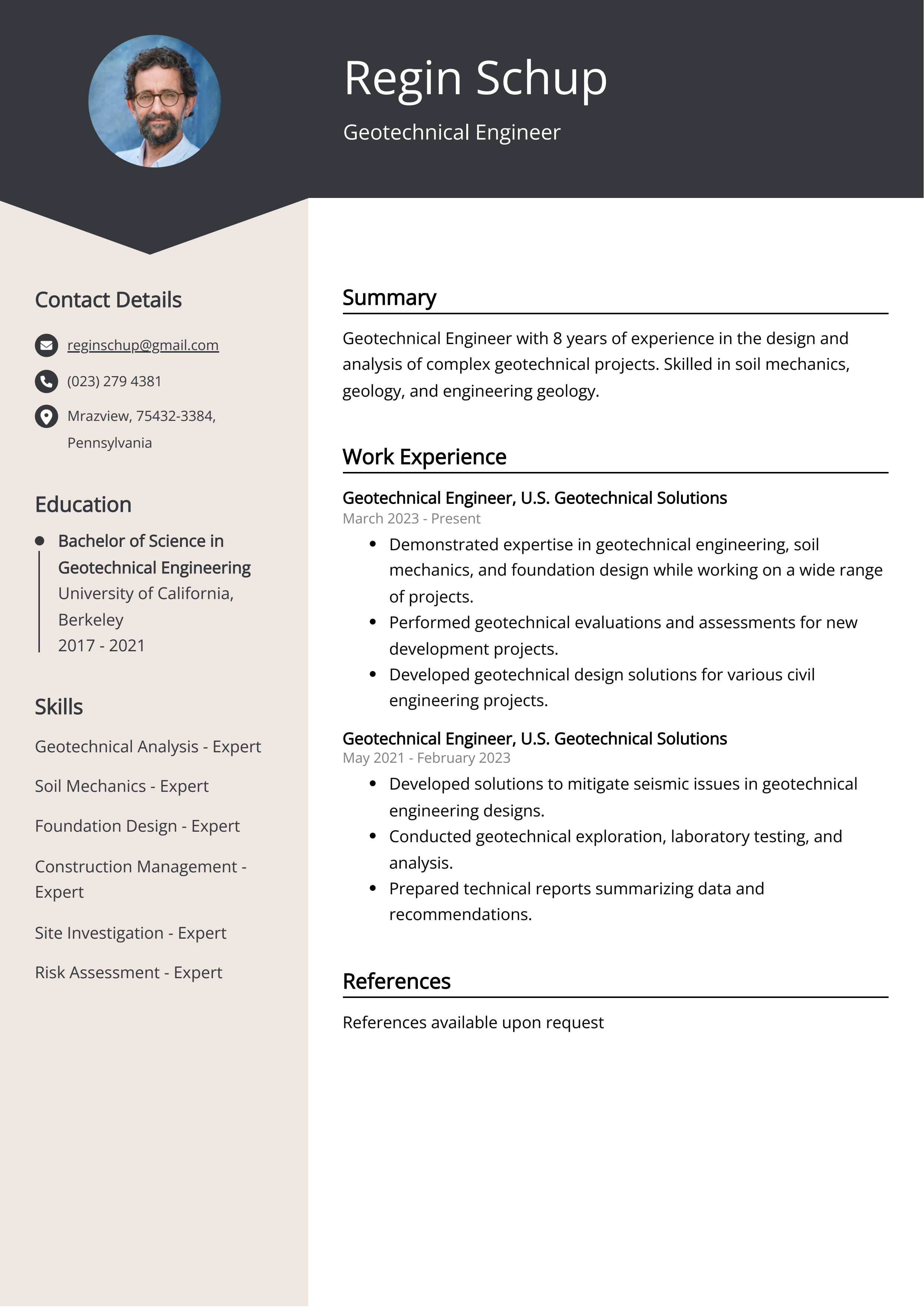How Geotheta can Save You Time, Stress, and Money.
How Geotheta can Save You Time, Stress, and Money.
Blog Article
All about Geotheta
Table of ContentsWhat Does Geotheta Mean?The Greatest Guide To GeothetaEverything about GeothetaGeotheta - QuestionsThe 6-Minute Rule for Geotheta

They conduct site examinations, collect samples, execute laboratory tests, and assess information to evaluate the suitability of the ground for building tasks - Geotechnical Engineers. Based on their findings, geotechnical designers supply referrals for structure design, slope stability, maintaining frameworks, and reduction of geotechnical hazards. They collaborate with other experts, such as designers, architectural designers, and building and construction groups, to make certain that geotechnical considerations are integrated right into the overall project style and implementation
By evaluating the behavior and buildings of dirt and rock, they can recognize prospective geotechnical threats such as landslides, dirt negotiation, or incline instability. Their expertise aids prevent failings or crashes that can jeopardize lives and home. Here are some comprehensive responsibilities and responsibilities of a geotechnical engineer: Website Investigation: Geotechnical engineers conduct site investigations to gather information on subsurface problems.
They interpret the data to comprehend the properties and habits of the soil and rock, including their strength, leaks in the structure, compaction characteristics, and groundwater problems. Geotechnical Analysis and Style: Geotechnical engineers evaluate the data gathered during website investigations to evaluate the stability and suitability of the website for construction projects. They carry out geotechnical computations and modeling to examine elements such as bearing capacity, negotiation, incline security, lateral earth stress, and groundwater circulation.
The Facts About Geotheta Uncovered
Foundation Design: Geotechnical engineers play an essential role in making structures that can securely sustain the desired structure. They assess the dirt problems and load needs to figure out the suitable foundation type, such as shallow structures (e.g., grounds), deep foundations (e.g (https://penzu.com/p/952dfde2dba9ee4f)., piles), or specialized techniques like dirt enhancement. They take into consideration aspects such as negotiation limits, bearing capacity, and soil-structure communication to establish optimum foundation layouts
They evaluate construction plans, screen site activities, and perform area examinations to confirm that the layout referrals are followed. If unforeseen geotechnical issues develop, they analyze the scenario and provide suggestions for remediation or adjustments to the layout. Risk Evaluation and Reduction: Geotechnical designers analyze geotechnical risks and dangers associated with the job website, such as landslides, liquefaction, or soil erosion.

Collaboration and Interaction: Geotechnical engineers work very closely with various other professionals included in a job, such as architects, structural engineers, and construction groups. Effective communication and partnership are important to integrate geotechnical factors to consider into the general task design and building and construction procedure. Geotechnical designers supply technical proficiency, solution questions, and make certain that geotechnical requirements are fulfilled.
The Buzz on Geotheta
Here are some sorts of geotechnical engineers: Structure Engineer: Foundation designers specialize in developing and evaluating structures for structures. They evaluate the soil problems, tons requirements, and website qualities to determine one of the most proper structure type and layout, such as shallow structures, deep foundations, or specialized techniques like pile structures.
They assess the elements influencing incline security, such as soil residential or commercial properties, groundwater conditions, and slope geometry, and establish methods to stop slope failures and mitigate risks. Earthquake Designer: Earthquake engineers specialize in assessing and designing frameworks to withstand seismic pressures. They analyze the seismic hazard of a site, review soil liquefaction possibility, and develop seismic style standards to make sure the security and durability of structures during earthquakes.
They execute field screening, gather samples, and analyze the collected data to characterize the soil homes, geologic developments, and groundwater conditions at a site. Geotechnical Instrumentation Engineer: Geotechnical instrumentation engineers concentrate on surveillance and measuring the actions of soil, rock, and structures. They set up and preserve instrumentation systems that check variables such as soil settlement, groundwater levels, incline movements, and architectural displacements to assess performance and give early cautions of possible concerns.
Rumored Buzz on Geotheta
They perform examinations such as triaxial examinations, combination examinations, straight shear examinations, and permeability examinations to collect data for geotechnical analysis and layout. Geosynthetics Engineer: Geosynthetics designers specialize in the style and application of geosynthetic materials, such as geotextiles, geogrids, and geomembranes. They use these products to boost soil security, reinforce inclines, provide water drainage remedies, and control erosion.
They tend to be investigatory people, which indicates they're intellectual, reflective, and inquisitive. They are curious, systematic, logical, logical, and sensible. Some of them are likewise social, implying they're kind, charitable, cooperative, patient, caring, helpful, understanding, tactful, and pleasant - Geo Tech Engineering.
In the workplace environment, geotechnical designers utilize specialized software go right here program devices to do computations, produce designs, and analyze data. They prepare records, review task requirements, interact with customers and staff member, and coordinate project tasks. The workplace setting supplies a helpful setting for research study, evaluation, and cooperation with various other specialists associated with the task.
The Greatest Guide To Geotheta
They frequently check out project websites to carry out website investigations, examine geotechnical conditions, and gather data for analysis. These brows through include traveling to various locations, sometimes in remote or difficult surfaces. Geotechnical engineers may perform soil tasting, conduct tests, and display building and construction activities to ensure that the geotechnical elements of the task are being applied properly.
Geotechnical designers additionally operate in specialized geotechnical labs. In these centers, they conduct experiments, do examinations on dirt and rock examples, and evaluate the engineering residential properties of the materials. Geotechnical lab engineers function extensively in these settings, handling testing devices, operating instruments, and recording data. They collaborate with other laboratory team to guarantee exact and dependable testing results.
Report this page